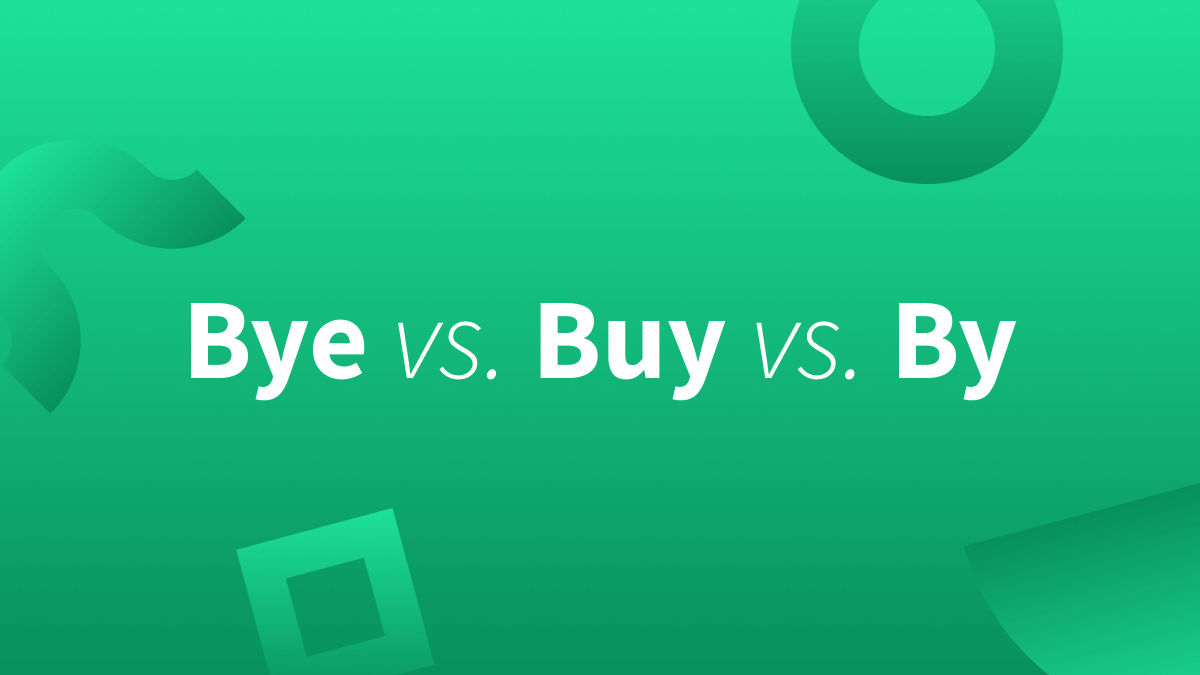- Buy means “to obtain something in exchange for payment.”
- By is used as a preposition that has several meanings, but it’s commonly used to indicate that you’re “in proximity” to something.
- Bye is the shortened version of goodbye.
- ○ I wanted to buy new shoes to wear at the ceremony.
- ○ I’m standing by the statues.
- ○ Bye! I’ll see you next time.
The Homophones “Buy,” “By,” and “Bye”
Buy, by, and bye are homophones, meaning they’re pronounced the same but have different spellings and meanings. Whether you’re learning the language or a native speaker, homophones can be tricky. Below, we’re going to go over the definitions of buy, by, and bye, but we’re also going to show you a foolproof way of always using these words correctly.
When To Use “Buy”
Buy is a verb that refers to “obtaining something in exchange for money.”
When you get out of work, can you buy milk?
The simple past tense and past participle of buy is bought.
I bought lottery tickets yesterday.
Buy can also be used as a noun that refers to “a purchase.”
Wow, you only paid $5 for that? That’s a great buy.
Although colloquial, sometimes people use buy to mean “accept” or “believe.”
I don’t buy what you’re saying.
= I don’t believe what you’re saying.
When To Use “By”
As a preposition, by has several uses. We’ll go over the most common.
1. “In proximity to”
I am by the house.
2. “Into the vicinity and beyond”
She walked right by me.
3. “No later than”
You need to be here by 5 PM.
4. “Through the agency or instrumentality of”
The movie was directed by Quentin Tarantino.
5. “In the opinion of”
That’s fine by me.
By can also function as an adverb that shows movement “past” something.
They drove by.
Because by has so many uses and definitions, it’s the most challenging of the three to learn. Just try to remember that this word is used as a preposition that shows who or what did something, how something was done, how close something is, or that something has to be done by a certain time.
When To Use “Bye”
When someone says or writes bye, they are usually referring to the shortened version of the word goodbye, which is what one says when they are leaving.
Bye, Jordan. We’ll get together again soon.
It’s not uncommon for people to say bye-bye.
Bye-bye! I’ll be back for lunch.
Occasionally though, bye is used as a noun in the sports world. This bye refers to when a player or team doesn’t have an opponent for one round of the tournament, but automatically plays in the next round.
We have a bye, so the players will get to rest.
Say Bye-Bye to Spelling and Grammar Errors
Distinguishing homophones can be a challenge. To always use buy, by, and bye correctly, keep this in mind:
- Buy and purchase are synonyms, and they both have a “u.”
- By is used as a preposition, never as a verb or noun.
- Bye is what you say when you want to say goodbye.
If you want to say bye to spelling and grammar errors, try LanguageTool. This multilingual writing assistant can detect and correct misspelled words, accidental typos, and missed punctuations in several internet browsers and apps.

